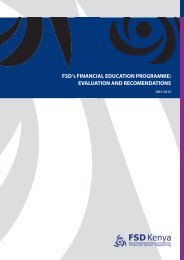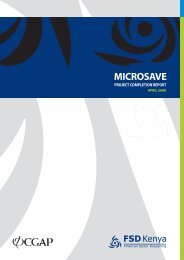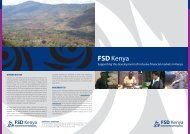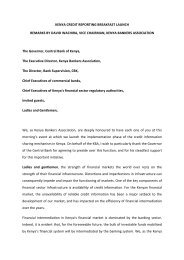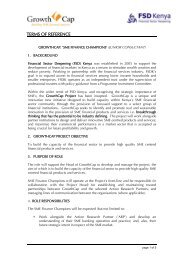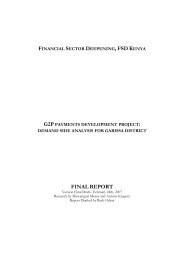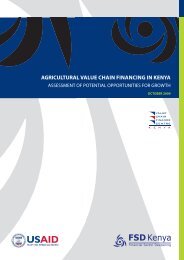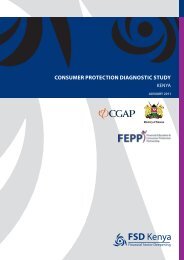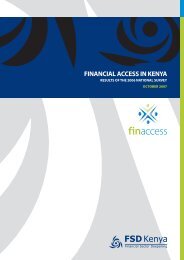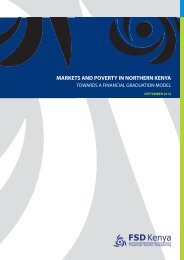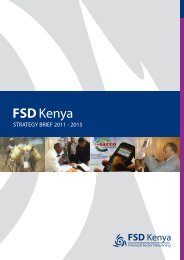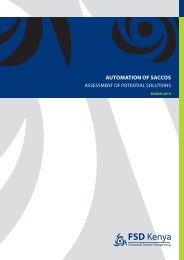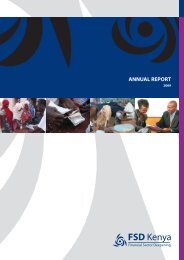SME Trade Finance: Review of facilities available in - FSD Kenya
SME Trade Finance: Review of facilities available in - FSD Kenya
SME Trade Finance: Review of facilities available in - FSD Kenya
You also want an ePaper? Increase the reach of your titles
YUMPU automatically turns print PDFs into web optimized ePapers that Google loves.
24 • <strong>SME</strong> TRADE FINANCE – REVIEW OF FACILITIES AVAILABLE IN KENYA<br />
Other areas <strong>of</strong> uncerta<strong>in</strong>ty both for the traders and their bankers arise from<br />
disruptions to the market caused by the large <strong>in</strong>volvement <strong>of</strong> Government<br />
subsidised imports. An example is the distribution <strong>of</strong> fertilisers, which puts<br />
the private traders at risk. F<strong>in</strong>ally, an area worth explor<strong>in</strong>g is the Procurement<br />
<strong>of</strong> Government orders (a significant part <strong>of</strong> which, consists <strong>of</strong> imported<br />
equipment) which could be supplied by <strong>SME</strong>s. A problem <strong>in</strong> consider<strong>in</strong>g<br />
f<strong>in</strong>ance <strong>in</strong> such cases arises from the size <strong>of</strong> the Local Purchase Order (LPO), <strong>in</strong><br />
comparison with the net worth <strong>of</strong> the <strong>SME</strong> supplier.<br />
<strong>SME</strong>s face difficulty secur<strong>in</strong>g the required bid bond and performance<br />
bonds, which usually represents 5 - 10% <strong>of</strong> the contract. Banks should<br />
explore solutions to develop the provision <strong>of</strong> back to back performance<br />
bonds. These would be based on a ‘master’ performance bond from<br />
the foreign supplier and, if the contract is for Delivery Duty Paid (DDP),<br />
eventual pre-f<strong>in</strong>anc<strong>in</strong>g <strong>of</strong> the importer charges at the port <strong>of</strong> delivery.<br />
Recommendation:<br />
The Bankers Association should commission sector studies<br />
<strong>in</strong> cooperation with the various Bus<strong>in</strong>ess Associations, Credit<br />
Reference Bureaus and the Export Promotion Council. These<br />
studies would: 1) assess the f<strong>in</strong>ancial characteristics <strong>of</strong> <strong>SME</strong>s <strong>in</strong> the<br />
various sectors <strong>in</strong>volved <strong>in</strong> trade, and 2) analyse their trade f<strong>in</strong>ance<br />
requirements and their performance on a historical basis.<br />
Recommendation:<br />
<strong>Review</strong> the possibility <strong>of</strong> design<strong>in</strong>g specific favourable requirements<br />
to allow <strong>SME</strong>s to be <strong>in</strong>volved <strong>in</strong> tenders for the Government. This<br />
would facilitate their participation <strong>in</strong> the sourc<strong>in</strong>g <strong>of</strong> goods and<br />
equipment from the <strong>in</strong>ternational markets. The requirements<br />
should rely on the above quoted study by the <strong>Kenya</strong> Institute for<br />
Public Policy Research and Analysis (KIPPRA): Support<strong>in</strong>g MSEs to<br />
Access Public Procurement Market <strong>in</strong> <strong>Kenya</strong>, DP/65/2006, as well<br />
as on the GrowthF<strong>in</strong> 2007 study: Operations <strong>of</strong> Procurement and<br />
Supply <strong>in</strong> <strong>Kenya</strong>.<br />
Box 13: The special case <strong>of</strong> Public procurement<br />
3.2.4 Constra<strong>in</strong>ts to <strong>SME</strong> <strong>Trade</strong> <strong>F<strong>in</strong>ance</strong><br />
This chapter provides an analysis <strong>of</strong>:<br />
the trade f<strong>in</strong>ance requirements <strong>of</strong> <strong>SME</strong>s <strong>in</strong> <strong>Kenya</strong>, and<br />
Government purchases represent a sizable amount <strong>of</strong> imported goods and equipment. A special regulation already favours local companies for procurements<br />
below $800,000, giv<strong>in</strong>g a 15% price preference to local companies. But it is still difficult for <strong>SME</strong>s to take advantage <strong>of</strong> this preference when they have to secure<br />
the required f<strong>in</strong>anc<strong>in</strong>g to tender for these contracts. The ma<strong>in</strong> difficulty is the post<strong>in</strong>g <strong>of</strong> Performance bonds, which are usually for 10% <strong>of</strong> the contract, and for<br />
which banks usually require full coverage. A comprehensive study <strong>of</strong> the matter was prepared <strong>in</strong> 2006 to address this issue: Support<strong>in</strong>g MSEs to Access the Public<br />
Procurement Market <strong>in</strong> <strong>Kenya</strong>, DP/65/2006, by the <strong>Kenya</strong> Institute for Public Policy Research and Analysis. Its ma<strong>in</strong> conclusion, as far as f<strong>in</strong>anc<strong>in</strong>g is concerned,<br />
proposes the establishment <strong>of</strong> a guarantee fund which would screen the tender<strong>in</strong>g <strong>SME</strong>s accord<strong>in</strong>g to their f<strong>in</strong>ancial strength. The fund would also adapt the<br />
tender security guarantee requirement accord<strong>in</strong>g to the risks.<br />
1.<br />
2.<br />
the reasons for any gaps and constra<strong>in</strong>ts <strong>in</strong> the provision <strong>of</strong> such<br />
services.<br />
<strong>SME</strong>s <strong>in</strong> <strong>Kenya</strong> face the same general difficulties as <strong>SME</strong>s all over the world.<br />
Their limited capitalisation is a particular problem, <strong>in</strong> addition to their limited<br />
management capacity, technical skills and market awareness.<br />
A lack <strong>of</strong> understand<strong>in</strong>g <strong>of</strong> the trade f<strong>in</strong>ance <strong>in</strong>struments<br />
A few <strong>SME</strong>s, notably <strong>in</strong> the trade sector, are familiar with <strong>in</strong>ternational trade<br />
tools. Yet the vast majority <strong>of</strong> the small and medium companies lack f<strong>in</strong>ancial<br />
expertise, and trade f<strong>in</strong>ance expertise <strong>in</strong> particular. This is def<strong>in</strong>itely a drawback<br />
<strong>in</strong> build<strong>in</strong>g trust and understand<strong>in</strong>g between the <strong>SME</strong>s and their banks.<br />
Recommendation:<br />
The various bus<strong>in</strong>ess associations should step up the organisation<br />
<strong>of</strong> tra<strong>in</strong><strong>in</strong>g sem<strong>in</strong>ars for <strong>SME</strong> staff. Partial fund<strong>in</strong>g for such sem<strong>in</strong>ars<br />
could be sourced from various donors. The relevant accredited<br />
tra<strong>in</strong>ers/tra<strong>in</strong><strong>in</strong>g <strong>in</strong>stitutions, together with the bus<strong>in</strong>ess<br />
associations, should be the driv<strong>in</strong>g force beh<strong>in</strong>d the organisation<br />
<strong>of</strong> such sem<strong>in</strong>ars. This would be based on access to donor fund<strong>in</strong>g<br />
programmes for deliver<strong>in</strong>g such capacity build<strong>in</strong>g workshops. The<br />
<strong>SME</strong> Solutions Center is probably the proper venue to promote<br />
such a scheme.



